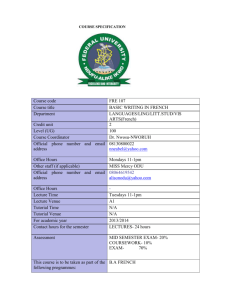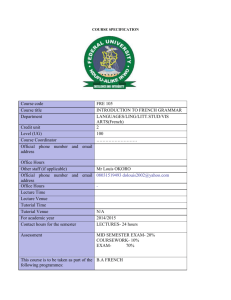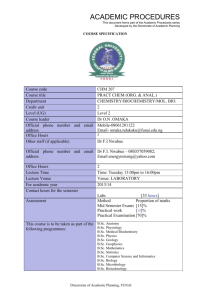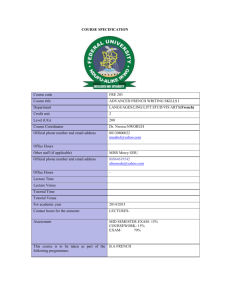View/Open
advertisement
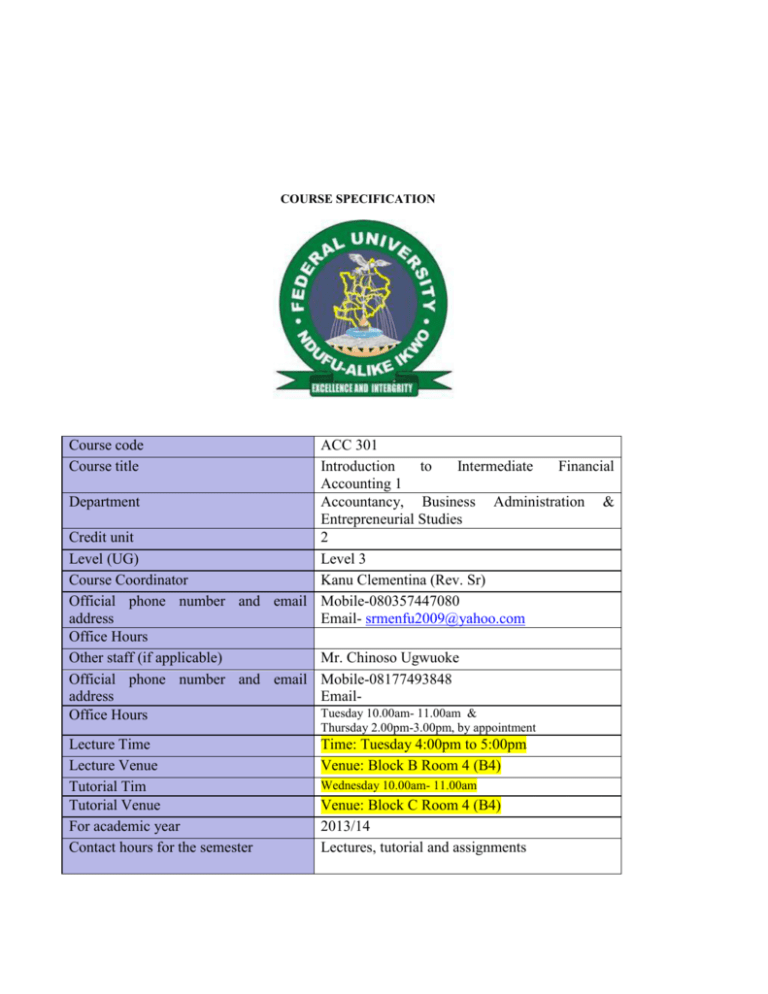
COURSE SPECIFICATION Course code Course title ACC 301 Introduction to Intermediate Financial Accounting 1 Department Accountancy, Business Administration & Entrepreneurial Studies Credit unit 2 Level (UG) Level 3 Course Coordinator Kanu Clementina (Rev. Sr) Official phone number and email Mobile-080357447080 address Email- srmenfu2009@yahoo.com Office Hours Other staff (if applicable) Mr. Chinoso Ugwuoke Official phone number and email Mobile-08177493848 address EmailTuesday 10.00am- 11.00am & Office Hours Thursday 2.00pm-3.00pm, by appointment Lecture Time Lecture Venue Tutorial Tim Tutorial Venue For academic year Contact hours for the semester Time: Tuesday 4:00pm to 5:00pm Venue: Block B Room 4 (B4) Wednesday 10.00am- 11.00am Venue: Block C Room 4 (B4) 2013/14 Lectures, tutorial and assignments Assessment Method Proportion of marks Mid Semester Exam [15]% Coursework [15]% Examination [70]% This course is to be taken as part of the BSc Business and Management BSc Business and Management (Accounting) following programmes: BSc Sociology BSc Psychology COURSE AIMS- ALIGNMENT WITH FUNAI’S VISION, MISSION AND PROGRAMME OBJECTIVE The objective of this course is to produce very brilliant students who will be equipped with good knowledge of financial accounting and be happy to embrace the real world of accounting. INTENDED LEARNING OUTCOMES Having completed this course the student is expected to: 1. 2. 3. 4. 5. 6. 7. 8. Understand key concept of company account Explain the meaning of company, types of company and formation of company Understand how shares are being issue in order to raise capital for the running of the companies. Know to make accounting entries in amalgamation Understand how to prepare absorption account Know how to prepare capital reduction and capital reconstruction Know how to prepare conversion of partnership to Limited Liability Company. Understand how to treat IFRS. LEARNING AND TEACHING METHODS The course will be delivered through a combination of lectures, tutorials and assignments. INDICATIVE CONTENT Lecture/Assignments programme FUNAI WEEK Topic/Reading for private study Tasks/Think points for private study Lecturer 1. Introduction to company account. 2. Types of shares Introduction to company account Unit 1 Types of company shares Unit 11 Rev. Sr, C Kanu 3. Redemption of denentures Redemption of debentures Unit 111 4. 5. Amalgamation Absorption Amalgamation Unit 1V Absorption Unit V Rev. Sr, C Kanu 6. Conversion of partnership Rev. Sr, C Kanu 7. Mid –Semester Test Conversion of partnership to ltd liab co. Unit VI Mid–Semester Test 8. Conversion of partnership Rev. Sr, C Kanu 9. Amalgamation of partnership 10 11. 12.. 13. 14. 15. 16. 17. Amalgamation of partnership Capital reduction Capital reconstruction Cash flow statement IFRS In class Revision Exams Exams Conversion of partnership to ltd liab co. Unit V11 Amalgamation of partnership . Unit V111 . Amalgamation of partnership Unit IX Capital reduction Unit X Capital reconstruction Unit X11 Cash flow statement Unit X111 IFRS Unit X1V Mr. Chinoso Ugwuoke Mr. Chinoso Ugwuoke Mr. Chinoso Ugwuoke Rev. Sr, C Kanu Rev. Sr, C Kanu Rev. Sr, C Kanu Rev. Sr, C Kanu Rev. Sr, C Kanu Rev. Sr, C Kanu Rev. Sr, C Kanu INDICATIVE KEY LEARNING RESOURCES Core reading list 1. Essentials of Fincancial Accounting O.A., Longe and R.A Kazeem 2.Financial Accounting made Simple Vol. 1 , Robert O.Igbem. FCA 3. Accountancy for higher exams C.S. Ola Please use, or refer to, in your lecture/ assignment sessions the notions and/or material in the books listed above Supplementary reading www.ffinancial accounting .org CONTINIOUS ASSESSMENT The Intended Learning Outcomes are assessed through: Assessment Mid semester Exams Coursework (Assignment) Semester Exams Weight 15% 15% 70% Deliverables - important dates Ensure that you make a careful note of when the assessment tasks are due in for this course. Try not to leave working on these tasks until the last minute – this is stressful for you and tends to lead to poor quality work. Remember that you have several assessments (for different courses) due the same week and you will need to plan for this. Assessment Mid semester exam- Due date FUNAI WEEK 10 To be held at the regular class time and venue Coursework Feedback & Result 14 working days after the assessment Feedback on your work TO BE DETERMINED BY COURSE COORDINATOR FUNAI WEEK 22-23 The university is committed to providing 14 working days after the Semester Exam you with assessment written feedback for all assessed coursework within 14 working days from the submission date. You will get feedback on your performance on a feedback form which will be returned to you. If you do not receive feedback within this time, then you should first contact the course leader. If it proves necessary, you should then contact the Head of Department. Submitted coursework, including your final year project, will not be returned to you. This is true for all coursework, in all courses and at all levels, and does not apply to only this course. We must keep the original copy of all coursework to provide the external examiners with a complete record of your work. Late coursework It is the University policy to accept and grade all late items of coursework (up to the published latest date for submission). There is no such thing as 'an extension'. You cannot negotiate new deadlines, and you do not need to get agreement about handing in your work late from the course leader or any other member of staff. Late coursework submissions are, however, subject to penalties (capping) that determine the maximum grade that you can achieve depending upon how late the work is. The current penalty scale can be found below: The following caps to be uniformly applied, in the absence of relevant mitigating circumstances accepted by the BoE: Up to 1 working day late Up to 2 working days late Up to 5 working days late Up to 10 working days late Up to 15 working days late More than 15 working days late Mark capped at 90% Mark capped at 80%; Mark capped at 70%; Mark capped at 60%; Mark capped at 50%; Mark capped at 0%. A working day is here defined as Monday to Friday at any time of year, with the exception of Nigeria national holidays. Students with mitigating circumstances can apply to have penalties removed via submission of the appropriate form and evidence within 7 days of the submission deadline. How to do this can be found in the University Assessment Policy and Procedure. Planning your time i. Students are expected to attend all classes including seminars and laboratory sessions for each course. It is mandatory for students to have a minimum attendance of 75% in this course to be eligible to take the final semester examination. ii. Note: Instructors are not required to provide mid semester test make-up.

